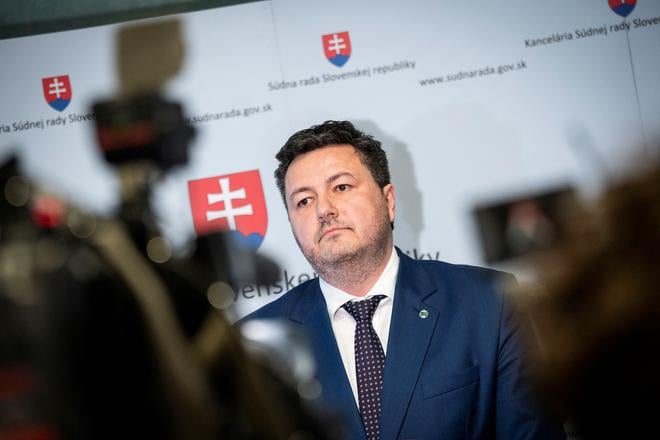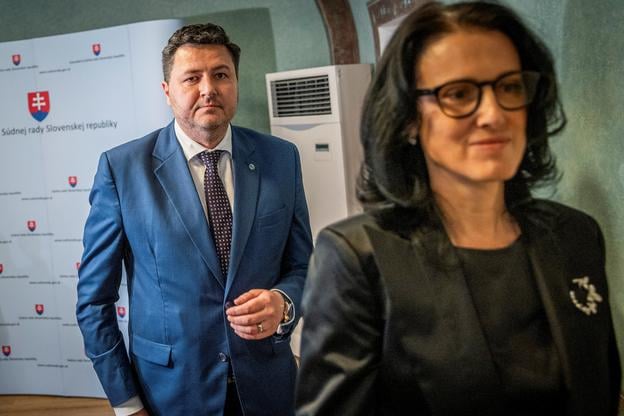Slovakia’s Judicial Council has elected František Mozner as the new president of the Supreme Court, despite a record that includes disciplinary proceedings for excessive delays in case handling. The move has raised questions about judicial accountability and transparency at the country’s highest court.
Mozner, who currently heads the criminal law division of the Supreme Court, secured 15 of the 17 votes cast by council members on Tuesday. One seat on the 18-member Judicial Council is currently vacant. His opponent, Andrea Moravčíková, received a single vote.
Mozner’s candidacy came with a history: he has faced two disciplinary proceedings for delays in delivering decisions, including one in which he was formally reprimanded in January 2024, according to Sme. A second proceeding resulted in acquittal, though some observers regarded the ruling as legally questionable.
He was also previously criticised by the Constitutional Court for delays in the high-profile “billboard tender” case, in which two former ministers from the Slovak National Party were convicted. In that case alone, the Supreme Court took two to three years to reject appeals — and Mozner took over six months to draft the ruling.
Despite these issues, the Judicial Council barely discussed his disciplinary record during the confirmation process. When asked why no debate had taken place, council chair Marcela Kosová said: “It’s already time-barred. He received a reprimand.”
Quiet controversies
The contrast was particularly notable given that Kosová herself had recently filed a disciplinary motion against another judge, Pamela Záleská, also for delays. In Mozner’s case, however, past infractions were not considered disqualifying.
Council member Marián Fečík, prior to the vote, described concerns about Mozner’s disciplinary past as “inaccurate information”. Asked whether he wished to respond, Mozner replied curtly: “To be honest, not really.” Fečík noted that in the case for which Mozner was acquitted, the disciplinary panel acknowledged the occurrence of two delays but declined to issue a penalty, citing concerns about potential political motivation from the former justice minister, Mária Kolíková, who had initiated the case.
In an apparent reference to that episode, Kosová later remarked: “It seems that was enough for everyone.”
The decision to overlook these matters has reignited debate about the moral and professional standards expected of judges in leadership roles.
Election dynamics
Mozner was the clear favourite going into the vote, having been nominated by 11 judges from his own division. Moravčíková was proposed by the outgoing court president, Ján Šikuta. Mozner’s broad support on the Judicial Council came despite questions over potential conflicts of interest.
Fečík, for instance, had been part of the disciplinary panel that cleared Mozner. Months later, Mozner, then president of the Slovak Judges’ Association, endorsed Fečík’s candidacy for the Judicial Council in an email to colleagues. Asked whether this raised ethical concerns, Fečík replied: “I see no conflict. I don’t understand what the issue would be.”
He declined to reveal how he had voted in the secret ballot. According to the minutes published the day after the vote, Fečík voted for Mozner.
The road ahead
Mozner outlined his vision for the Supreme Court in a two-and-a-half-hour presentation. He pledged to step down as both president of the Slovak Judges’ Association and head of the criminal law division if appointed.
He also announced his intention to replace the current director of the Supreme Court’s administrative office, Ľubica Karvayová, who was appointed by Šikuta in 2022. “I can’t imagine fulfilling my goals while working with the current director,” Mozner said, describing the role as even more important than that of the deputy court president.
He also criticised Šikuta’s handling of several institutional matters, including stalled renovation plans for the court building and a lack of initiative in securing a larger budget. Mozner argued that the court president must be willing to negotiate directly with the finance minister.
If confirmed by President Peter Pellegrini, Mozner will formally succeed Šikuta, whose term ends on 20 May.
Political overtones
Mozner also addressed a recent attempt by the Justice Ministry, led by Boris Susko of the ruling Smer party, to inspect the court’s electronic case allocation system. Šikuta had refused access, citing concerns about confidentiality. Mozner said both sides had handled the situation poorly, though he expressed scepticism that any manipulation had occurred, as alleged by coalition politicians.
He emphasised that while the ministry oversees the software used across all courts, inspections must be conducted in a way that does not “contaminate the judicial process”.
Still, some members of the governing coalition appear to expect more from Mozner. MP Roman Michelko of the far-right Slovak National Party recently suggested that Mozner might “confirm” allegations that politically sensitive cases were consistently assigned to the same judge — Juraj Kliment. Michelko has called for prosecutions over what he describes as a “distortion” of justice.
Whether Mozner will meet such political expectations — or resist them — remains to be seen. Asked whether he was surprised that the Council had not questioned him more closely, he said simply: “I assessed the situation. I saw no obstacle to my candidacy. The rest of the question is for the members of the Council.”




